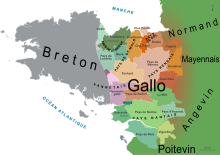Gallo language
| Gallo | |
|---|---|
| Galo | |
| Native to | France |
|
Native speakers
|
28,000 (date missing) |
| Official status | |
|
Recognised minority
language in |
|
| Language codes | |
| ISO 639-3 | – |
| Glottolog | gall1275 |
| Linguasphere | 51-AAA-hb |

The historical Gallo language area of Upper Brittany
|
|
Gallo is a regional language of France. It is not as commonly spoken as it once was, as the standard form of French now predominates. Gallo is classified as one of the Oïl languages.
Gallo was originally spoken in the Marches of Neustria, which now corresponds to the border lands of Brittany and Normandy and its former heart in Le Mans, Maine. Gallo was the shared spoken language of the leaders of the Norman conquest of England, most of whom originated in Upper Brittany and Lower Normandy. Thus Gallo was a vehicle for the subsequent transformation ("Gallicisation") of English.
Gallo continued as the language of Upper Brittany, Maine and some neighbouring portions of Normandy until the introduction of universal education across France, but today Gallo is spoken by only a small minority of the population, having been largely superseded by standard French.
As an Oïl language, Gallo forms part of a dialect continuum which includes Norman, Picard and the Poitevin dialect, among others. One of the features that distinguishes it from Norman is the absence of Old Norse influence. There is some limited mutual intelligibility with adjacent varieties of the Norman language along the linguistic frontier and with Guernésiais and Jèrriais. However, as the dialect continuum shades towards Mayennais, there is a less clear isogloss. The clearest isogloss is that distinguishing Gallo from Breton, a Brittonic Celtic language traditionally spoken in the western territory of Brittany.
...
Wikipedia
